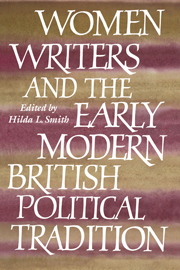Book contents
- Frontmatter
- Contents
- List of contributors
- Preface
- Introduction: Women, intellect, and politics: their intersection in seventeenth-century England
- Part I Women's political writings, 1400–1690
- Part II Women's political and philosophical writings, 1690–1800
- Part III The intellectual context and economic setting for early modern women
- Part IV Early modern legal and political prescriptions for women
- Introduction to Part IV
- 13 The politics of identity and monarchic government in France: the debate over female exclusion
- 14 The Holy Roman Empire: women and politics beyond liberalism, individual rights, and revolutionary theory
- 15 Women as sextons and electors: King's Bench and precedents for women's citizenship
- 16 “To be some body”: married women and The Hardships of the English Laws
- Conclusion: women's writing, women's standing: theory and politics in the early modern period
- Index
14 - The Holy Roman Empire: women and politics beyond liberalism, individual rights, and revolutionary theory
from Part IV - Early modern legal and political prescriptions for women
Published online by Cambridge University Press: 04 August 2010
- Frontmatter
- Contents
- List of contributors
- Preface
- Introduction: Women, intellect, and politics: their intersection in seventeenth-century England
- Part I Women's political writings, 1400–1690
- Part II Women's political and philosophical writings, 1690–1800
- Part III The intellectual context and economic setting for early modern women
- Part IV Early modern legal and political prescriptions for women
- Introduction to Part IV
- 13 The politics of identity and monarchic government in France: the debate over female exclusion
- 14 The Holy Roman Empire: women and politics beyond liberalism, individual rights, and revolutionary theory
- 15 Women as sextons and electors: King's Bench and precedents for women's citizenship
- 16 “To be some body”: married women and The Hardships of the English Laws
- Conclusion: women's writing, women's standing: theory and politics in the early modern period
- Index
Summary
The vast majority of studies exploring aspects of gender and power in early modern Europe have focused on England, France, and Italy, with developments in Germany – in the Holy Roman Empire – investigated only rarely. There are several reasons for this. Some of these come from its politics: the Empire, that loose amalgam of secular and religious states stretching across central Europe, does not fit into the way early modern political history is often taught – it is neither absolutist nor constitutionalist – so it is easier simply to leave it out. Its political history is, in comparison with England in the seventeenth century and France in the eighteenth, rather boring, seemingly backward, and tediously complex.
Descriptions of its politics – boring, backward, and tedious – have also been applied to its few well-known early modern women writers, who, like their male counterparts, were busier founding learned literary societies than thinking about the human condition. Where is the Empire's Mary Wollstonecraft? Its Mary Astell? Even its Margaret Cavendish? Why did the Querelle des femmes, that springboard for so much thought and writing about women, leave so few traces in the Empire? Or is it just that we don't know about German women's political writings, that they are waiting to be rediscovered, translated and edited in the way that Christine de Pizan's City of Ladies was two decades ago?
- Type
- Chapter
- Information
- Women Writers and the Early Modern British Political Tradition , pp. 305 - 323Publisher: Cambridge University PressPrint publication year: 1998



